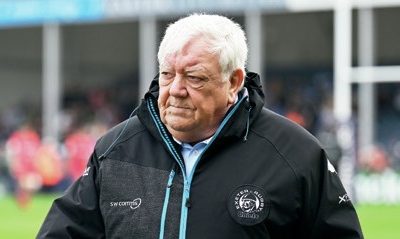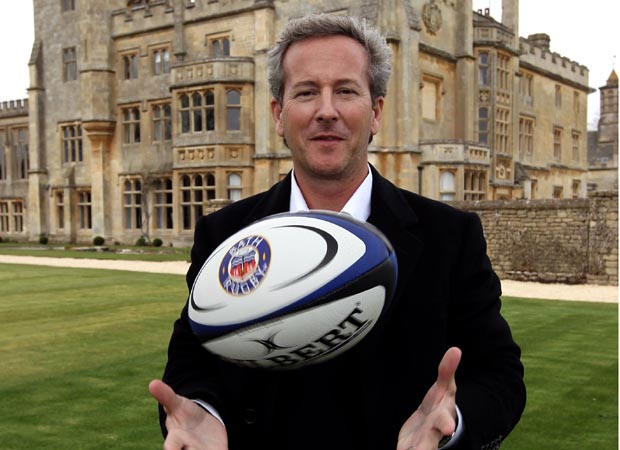 The battle lines have been drawn around the Heineken Cup – or the territory it once occupied – and there is a bloody fight looming. The only thing that appears capable of heading it off is if Northern Hemisphere rugby discovers a figure at the Nth hour with the diplomatic skills and charisma of a Nelson Mandela. Alas, there is no such candidate among the suits who inhabit international Rugby Union’s corridors of power.
The battle lines have been drawn around the Heineken Cup – or the territory it once occupied – and there is a bloody fight looming. The only thing that appears capable of heading it off is if Northern Hemisphere rugby discovers a figure at the Nth hour with the diplomatic skills and charisma of a Nelson Mandela. Alas, there is no such candidate among the suits who inhabit international Rugby Union’s corridors of power.
The warfare could have seismic repercussions for the administration of not just European rugby, but the world game, with the Rugby World Cup, the sport’s sacred cash cow, in danger of disruption.
This is because the vessel entrusted to deliver the IRB’s precious £150m cargo,
England 2015, and its captain, RFU chief executive Ian Ritchie, are caught between a rock and a hard place.
It is a storm which has been brewing ever since the game was declared professional 18 years ago, with all the thorny issues rammed into the ‘too difficult file’ at the time, now spilling out into the open.
At the nub of it is who runs the professional club game, with the Anglo-French club alliance prepared to flex its muscle and challenge the traditional right of the national Unions, and their Aunt Sally governing body, the IRB, to rule their part of the sport.
The essential component in this is who has primacy of contract over the elite pro players. In England and France it is the professional clubs in Premiership Rugby and the Top 14, mainly because the RFU and the FFR were too slow to react and contract their leading players in 1995. Therefore the clubs stepped into the breach.
The other participants in the Heineken Cup – Wales, Ireland, Scotland and Italy – did not have as many wealthy club investors, and it was the national Unions who eventually contracted the players centrally, as much by default as by design. This mirrored the clearer central structure in the SANZAR block in the Southern Hemisphere (South Africa, New Zealand and Australia).
 Throw into that incendiary concoction a European Rugby Cup (ERC) business model which the English and French clubs believe has denied them millions of pounds of revenue, and the plot thickens.
Throw into that incendiary concoction a European Rugby Cup (ERC) business model which the English and French clubs believe has denied them millions of pounds of revenue, and the plot thickens.
Stir into the mix the unbending refusal by the Celts and Italians to reform an ERC format in which commercially, and in terms of revenue split, the tail has wagged the dog due to their perpetual 4-2 veto over Anglo-French proposals for change, and it was always going to blow up.
This week there was an IRB Press conference in Canary Wharf at which their top table administrators attempted to deliver the good news about the huge £150m financial bonanza they anticipate from the England 2015 World Cup.
When it came to question time, the entreaties of Brett Gosper, the IRB’s chief executive, to the assembled media to convey at least something of their World Cup message fell on deaf ears. Instead, following last week’s unilateral decision by the Anglo-French clubs to run their own cross-border competition, questions on the future of the Heineken Cup rained down.
Predictably, Gosper appeared to nail the IRB’s colours to the ERC mast, saying, “we don’t believe in an Anglo-French competition – we strongly believe it should be a European competition”.
He added that any cross-border competition was subject to IRB approval. However, Gosper then delivered a double message in a subsequent BBC interview, saying that if the RFU and the FFR endorsed a replacement tournament for the Heineken Cup then the IRB would also feel obliged to do the same.
“If both Unions approve it, and felt comfortable with it… then the likelihood is we’d approve it.”
The IRB’s sudden sidestep indicated one of two things. Either Gosper is confident that there is no way the English and French Unions will approve the Anglo-French club tournament plan – or he believes they will back it, and that the IRB can ill-afford to jeopardise the 2015 World Cup by falling out with the RFU as host Union.
Whichever it is, the IRB will have to be very careful if they are to avoid a huge schism in the game which could severely damage the 2015 showpiece Gosper was so keen to advertise.
Where would the IRB’s main money-spinning tournament be, for instance, if the English clubs refused to release their players to England, or the French to France?
The signs are that with BT Sport’s cash behind them, the English and French clubs are not bluffing when they say they will no longer participate in an ERC-run tournament. If that is the case, Friday’s appointment of the Canadian barrister, Graeme Mew, as a mediator at the behest of IRB president Bernard Lapasset is a classic case of shutting the stable door after the horse has bolted.
It is plausible that the Anglo-French clubs have a huge bargaining chip in being able to deliver significantly more broadcast and sponsorship money than exists presently to all the participants in their new tournament – including to the Celts and Italians should they take up the invitation.
Given that the IRB have no hesitation in banging the drum to promote the earning power of the 2015 World Cup, it can hardly take issue with the Anglo-French clubs for attempting to maximise their own revenue streams.
Whether, after considering the big picture, the RFU have the inclination to go to war with their own clubs to save ERC – especially when the desperately need the Premiership’s cooperation to make a success of England 2015 – is a question with multi-million pound implications.
With only two years to go until the World Cup kicks off, it is also one on which the immediate future of Rugby Union rests.

4 Comments
You must be logged in to post a comment Login
Leave a Reply
Cancel reply
Leave a Reply
You must be logged in to post a comment.

British and Irish Lions
Charlie Elliott: The 17 backs I would select for the British and Irish Lions

British and Irish Lions
Charlie Elliott: The 21 forwards I would select for the British and Irish Lions squad
























Llanelli Fine Tee Co (@llanellitee)
25 September 2013 at 12:13 PM
The other participants in the Heineken Cup – Wales, Ireland, Scotland and Italy – did not have as many wealthy club investors, and it was the national Unions who eventually contracted the players centrally, as much by default as by design.
Not true in Wales.
Edser
25 September 2013 at 1:03 PM
Its all about the BT deal now. You saw that in the comments from Goze yesterday. Eng Clubs couldn’t go back to ERC, even if they wanted to. On that basis, 3 possible outcomes:
1) FFR whip the French clubs into line and Heino continues without the English.
2) Everyone agrees to disband ERC and set up something in its place.
3) French clubs resist their union and don’t return to ERC, leaving nothing except alot of spare weekends in the european rugby calendar to fill with matches by sub-standard championship and ProD2 teams.
JohnGunne
26 September 2013 at 8:52 AM
Number 1 ain’t going to happen, that would leave the French holding up the Pro12 even more than presently, I believe that the belligerence of the English and French and the intransigience of the Celts means the HEC is dead and so too in short order will be the regional game in the Celtic and Italian countries, legally the unions have no right in Europe to stop private clubs from running their own game, see the ‘Bossman’ (sic) football case in the EU courts. We will see an Anglo-French cup, the celts will return with the begging bowl within 3 years unless they are out of business entirely by then.
Patrick
26 September 2013 at 9:49 AM
The Celtic Nations and Italy are willing to compromise. It is the French and English clubs that are refusing to attend mediation talks.
Facts please!